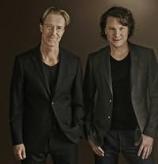The Father: Made in Sweden, Part I
Review
The Father: Made in Sweden, Part I
Don’t let that “Part I” stuff turn you away from THE FATHER. This isn’t one of those science fiction epic multiparters where the snow people are on a sentient choo-choo heading toward almost certain oblivion at the end of one volume and you have to wait five years for the next book to see who survives a 50-foot fall or dies from a curse unleashed by the sorceress of the High Calling. Not that there’s anything wrong with that. THE FATHER is instead a work of crime fiction closely based on real events that is complete in itself, though its ending will leave you wanting --- and demanding --- more.
The backstory of THE FATHER is in some ways almost as interesting as the book itself. “Anton Svensson” is a pseudonym for the collaborative team of Anders Roslund and Stefan Thunberg. Roslund is one of Sweden’s finest crime fiction writers who has co-authored with Börge Hellström the acclaimed Grens & Sundkvist series. Three of Thunberg’s brothers gained worldwide notoriety in Sweden during the 1990s by carrying out a series of 10 audaciously brilliant and increasingly successful bank robberies over the course of two years. None of these lads had so much as a traffic ticket before embarking on a life of crime, and all of them were under 24 years of age. Their father was very much a different story.
"THE FATHER is a heck of a story, skillfully written and ...darkly told, perfect for sociologists and criminologists, and virtually anyone who has ever cracked open a crime fiction novel and been spellbound."
The book’s format consists of chapters grouped into sections titled “Now” and “Then,” which alternate throughout the story. The “Now” deals with the exquisite plotting and executions of each bank robbery, while the “Then” concerns itself with the childhood of the three sons in a household under the brutal thumb of their father, a violent man who demanded perfection from everyone but himself and unquestioning obedience. Thunberg, who attended art school, was not involved in any of the crimes, but his knowledge of what occurred in the past and the book’s present, combined with his experience as a screenwriter for movies and television, gives it an immediacy and an air of suspense that infuses each and every page. This is particularly true in the “Now” sections.
On the one side we are presented with Leo, Felix and Vincent, the brothers behind the robberies, and Jasper, a friend who yearns to be the fourth brother and winds up failing by trying too hard. There is also a woman named Anneli, Leo’s significant other, who is a silent partner in the scheme, designing their unique masks while otherwise content to wait at home as they carry out their capers. Leo, the oldest, is definitely first among equals here. His abilities to plot everything, from the acquiring of the weaponry and selection of the banks to their escape routes and plans to hide in plain view, are responsible for their success. Leo is also fiercely protective of Vincent, his youngest brother, and it is ironic that this fraternal love is one of the very few weaknesses that ultimately put the authorities on the trail of the quartet.
The “authorities,” in this case, is John Broncks, a detective who is on the other side of the blind chessboard that is called an investigation. Broncks makes the robberies a priority case. He is, by the nature of things, constantly a few steps behind, yet his attention and obsessiveness with respect to detail result in his being the first to notice certain seemingly irrelevant and disparate elements that ultimately put him on the correct path to apprehending the team, even as he is distracted by the proximity of a former lover, a forensic investigator with whom he had been involved several years previously. The robberies defy prediction, but, as Broncks mentally notes to his invisible adversaries at one point, “Every time you rob a bank, I get a little closer.” Just so.
THE FATHER is a heck of a story, skillfully written and --- with the wondrous translating abilities of Elizabeth Clark Wessel --- darkly told, perfect for sociologists and criminologists, and virtually anyone who has ever cracked open a crime fiction novel and been spellbound. Prepare to have it happen again.
Reviewed by Joe Hartlaub on April 8, 2016





